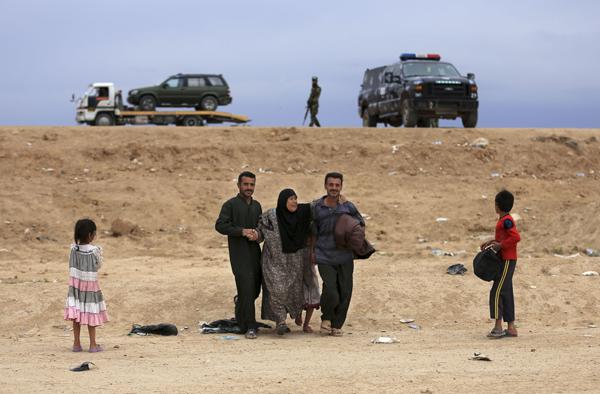You are here
Civilians escape Daesh grip as Iraqi forces push on in Ramadi
By AFP - Dec 23,2015 - Last updated at Dec 23,2015

Iraqi security forces search house to house for Daesh militants as they enter the southern neighbourhoods of Ramadi 115 kilometres west of Baghdad, Iraq, Wednesday (AP photo)
BAGHDAD () — Dozens of families the Daesh terror group had been using as human shields in Ramadi escaped to safety Wednesday as Iraqi forces closed in on the extremists’ last redoubts.
A day after punching deep into the city centre, forces led by the elite counter-terrorism service (CTS) inched towards the governmental compound in Ramadi, the capital of Iraq's vast Anbar province.
"The anti-terrorism troops are now poised to break into the Hoz area where the governmental compound is located," a brigadier general in the force told AFP.
Anbar officials said around 50 families managed to slip away during the fighting around the government compound.
"Ramadi residents who were held by Daesh in the city centre escaped the siege and went towards the military units in Tal Mshahideh" in eastern Ramadi, provincial council spokesman Eid Ammash al-Karbuli said.
He said thew were mostly children, women and elderly men who raised white flags as they approached the security forces.
Another council official said a family of four were executed by Daesh on Monday as they tried to leave.
Ibrahim Al Fahdawi, who heads the security committee in Khaldiya, east of Ramadi, said the families numbered around 50.
They were fed and buses were being prepared to take them to a camp away from the frontlines, he said.
The recapture of the government compound would mark another key step towards reasserting full control over Ramadi, whose liberation a CTS spokesman said should be achieved by Friday.
Government forces, which have been supported by daily air strikes from the US-led coalition, had to move carefully through the devastated city, whose deserted streets were littered with rubble and shrapnel.
Retreating Daesh fighters usually booby-trap their abandoned positions, plant roadside bombs and move in tunnels which can also be trapped with huge explosive charges.
Iraqi forces clearing residential neighbourhoods in Ramadi were finding huge amounts of ammunition and explosives, including rockets made from gas canisters.
Officials estimated before the latest push into Ramadi that no more than 300 Daesh fighters remained holed up in the centre.
"The fall of Ramadi is inevitable; the end is coming but... it's going be a tough fight," the US-led coalition's spokesman, Colonel Steve Warren, said Tuesday.
Besides the rescued civilians, Daesh fighters were also believed to have fled Ramadi centre to area further east along the Euphrates River valley.
"Dozens of Daesh members have withdrawn from the city centre towards Sufiya and Sichariyah," said Fahdawi.
Iraqi forces said they had faced limited resistance when they first pushed in on Monday and Tuesday, although Daesh claimed responsibility for a deadly ambush in a northern neighbourhood.
The recapture of Ramadi would further isolate Daesh-held Fallujah — which lies half way on the road to Baghdad — and undermine the viability of the group's self-proclaimed "caliphate".
Defence minister Khaled al-Obeidi said last week that successive operations by government for and their allies had shrunk Daesh territory in Iraq from roughly 40 percent of the country last year to 17 percent.
'Battle of attrition'
Tuesday's big push into central Ramadi was only the latest step in a months-long operation, which saw Iraqi forces gradually close in after cutting off supply lines into Anbar and retaking neighbourhoods, key roads and bridges one after the other.
"This has been a grinding battle of attrition. I think ISIS [Daesh] in Ramadi is exhausted. The city has been isolated for a while," said David Witty, a retired US army special forces colonel and former advisor to CTS.
The slow pace of the Ramadi operation had triggered calls from some critics for a greater role for the Shiite-dominated Hashed Al Shaabi paramilitary forces, or even US troops.
But Baghdad largely stuck to its strategy, resorting to newly trained local forces from Anbar to move in and hold the ground reconquered by federal forces.
The loss of Ramadi in mid-May was Baghdad's worst defeat in the war against Daesh, and its recapture would provide a welcome morale boost to the country's much-criticised military.
The extremist group still controls Mosul, Iraq's second city.
Related Articles
BAGHDAD — A wave of 15 suicide car bomb attacks by the Daesh terror group against Iraqi security forces was repelled east of the flashpoint
BAGHDAD — Iraqi forces retook the town of Heet from the Daesh terror group on Thursday after weeks of fighting, the military said, the lates
BAGHDAD — Iraqi security forces on Tuesday recaptured a large area on the southwestern side of Ramadi from the Daesh terror group, which ove

















